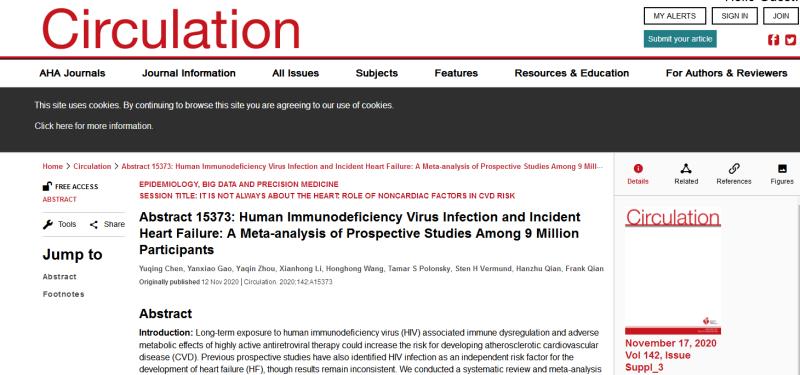Recently, the AIDS prevention and control research team of our hospital published a research Abstract entitled “ Human Immunodeficiency Virus Infection and Incident Heart Failure: A Meta-analysis of Prospective Studies Among 9 Million Participants” in CIRCULATION (Journal of CIRCULATION, IF=23.603). The 2019 postgraduate student Chen Yuqing was the first author. Professor Qian Hanzhu, Frank Qian and Li Xianhong co-instructed, and Tamar S Polonsky, Sten H Vermund, Professor Wang Honghong and Zhou Yaqin participated in the completion.

The study focused on the association between HIV and the risk of heart failure. Heart failure is the most serious challenge facing cardiovascular diseases in the 21st century, and despite significant advances in treatment, it still has a high incidence of morbidity and mortality. In prevention and treatment, early identification of the population that benefits from primary prevention of HEART failure is critical.
Previous studies have shown that HIV infected people have an increased risk of atherosclerotic cardiovascular disease (ASCVD). However, whether HIV infection also increases the risk of heart failure is still unclear, and there has been a lack of comprehensive analysis of epidemiological evidence. In order to fill this knowledge gap, the AIDS prevention and control research team of our school conducted a systematic review and meta-analysis of prospective studies to assess the association between HIV and the risk of heart failure. This new study provides the most comprehensive evidence to date for the association.
In the study, researchers identified 8 studies on the association. All prospective studies examined the relationship between the incidence rate of heart failure and the prevalence of HIV infection in adults aged 18 or above. The meta-analysis included health data for 8949448 participants. The results show that HIV infected people have almost twice the risk of heart failure compared with ordinary people. What's more, this increased risk is more obvious in young people, women and individuals with low CD4 counts. From the perspective of clinical and public health, more attention should be paid to the risk of heart failure in HIV infected people, and methods should be designed to better target this population for heart failure risk stratification, screening and early prevention and treatment.
Article link:https://www.ahajournals.org/doi/10.1161/circ.142.suppl_3.15373






